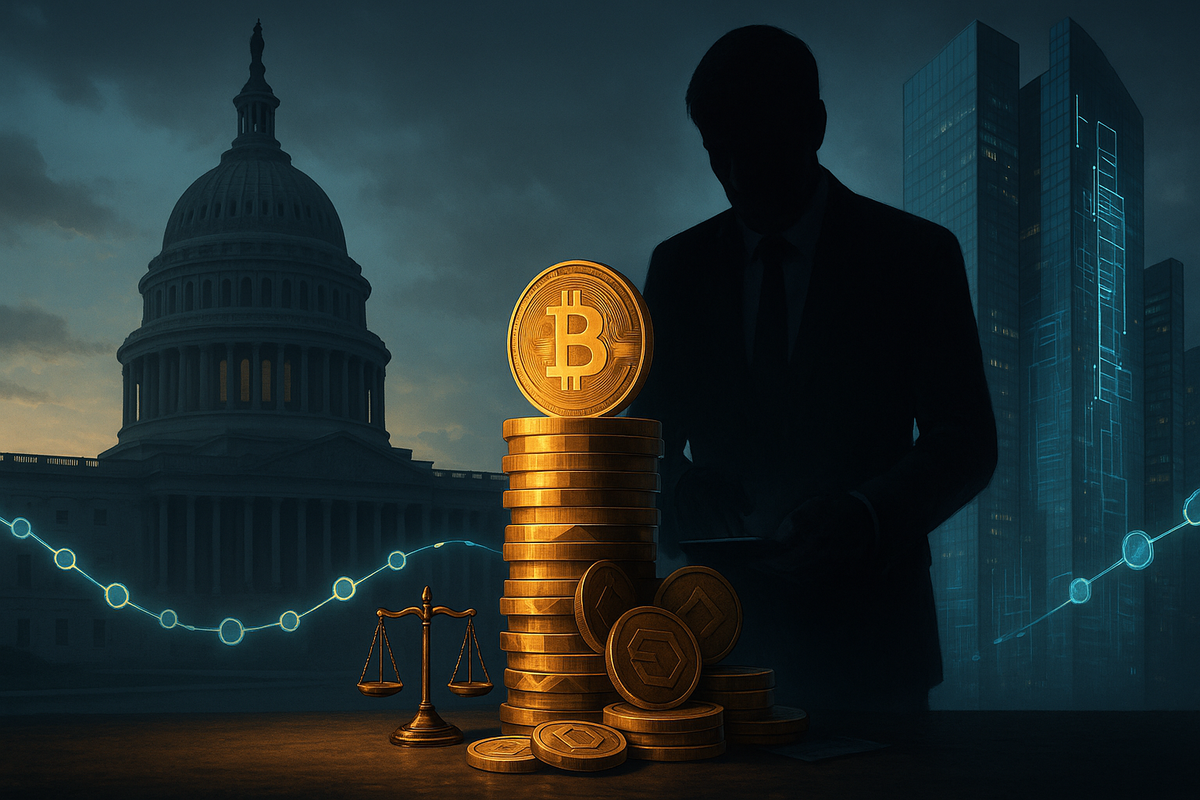
The intersection of political power and personal financial gain has always been a contentious area, but the recent convergence of Donald Trump's administration policies with his family's burgeoning cryptocurrency ventures has ignited an unprecedented ethical firestorm. As President Trump's White House enacts a series of pro-crypto executive orders and signs landmark legislation like the GENIUS Act, his family simultaneously expands a multi-billion-dollar digital asset empire, raising serious questions about conflicts of interest and the very fabric of governmental integrity. This unique scenario has created a highly favorable environment for the crypto industry, while simultaneously generating immense wealth for the First Family, fueling accusations that public office is being leveraged for private enrichment.
The immediate implications are profound. The regulatory landscape for digital assets in the United States is rapidly being reshaped into a "lighter touch" approach, fostering innovation but also creating a ripe environment for the Trump family's crypto holdings. This has led to a surge in market optimism within the crypto community, coupled with heightened scrutiny from ethics watchdogs and political opponents who point to an unprecedented accumulation of presidential wealth tied directly to policy decisions. The situation challenges traditional notions of public service and private enterprise, setting a potentially perilous precedent for future administrations.
The Digital Asset Deluge: How Trump's Policies Paved the Way for Family Fortunes
Upon re-entering the White House, President Donald Trump swiftly moved to pivot the nation's stance on digital assets, steering away from previous administrations' more cautious approaches. This strategic shift culminated in a series of executive orders and the groundbreaking Guiding and Establishing National Innovation for U.S. Stablecoins Act (GENIUS Act), which together have dramatically reshaped the regulatory environment for cryptocurrencies in the United States.
On January 23, 2025, President Trump signed an executive order, "Strengthening American Leadership in Digital Financial Technology." This directive championed open public blockchain networks, endorsed dollar-backed stablecoins, and mandated fair access to banking services for crypto businesses. Crucially, it prohibited Central Bank Digital Currencies (CBDCs) in the U.S., a stark reversal of prior policy. This was followed on March 6, 2025, by another executive order establishing a government Bitcoin reserve, mandating the retention of seized Bitcoin and tasking departments with strategies for further acquisition. The administration also rolled back several Biden-era crypto policies, including a more restrained enforcement approach from the Securities and Exchange Commission (SEC) and the closure of the Department of Justice’s cryptocurrency fraud investigations unit. An SEC “Crypto 2.0” task force was also formed to create a clearer regulatory framework.
The legislative cornerstone of this new era arrived in July 2025 with the bipartisan GENIUS Act. This Act is the first major federal legislation to specifically regulate the cryptocurrency industry, establishing a comprehensive framework for payment stablecoins. It mandates that stablecoins be 100% backed by liquid assets like U.S. dollars or short-term Treasuries, requiring monthly public disclosures of reserves and strict marketing rules. These policies, critics argue, are not merely coincidental but directly benefit the burgeoning crypto enterprises tied to the Trump family.
Key players involved extend beyond the President himself to his children, Eric, Donald Jr., and Barron Trump, who are deeply enmeshed in various crypto ventures. Their firm, World Liberty Financial (WLF), a decentralized finance (DeFi) platform, launched its stablecoin, USD1, in March 2025, directly aligning with the GENIUS Act's regulatory focus. Eric and Donald Trump Jr. also founded American Bitcoin, a Bitcoin mining company that later merged with publicly traded Gryphon Digital Mining (NASDAQ: GRYN), where Eric Trump holds a significant stake. President Trump has also launched his own $TRUMP Memecoin and multiple NFT collections, all contributing to a reported multi-billion-dollar increase in the family's net worth, with cryptocurrency now reportedly surpassing traditional real estate as their primary source of wealth. Initial market reactions have been largely positive within the crypto sector, with surges in Bitcoin prices and increased institutional interest, yet the ethical implications continue to draw fierce condemnation from watchdog groups and Democratic lawmakers.
The Crypto Crossroads: Who Wins and Who Loses in the New Regulatory Landscape
The regulatory shifts engineered by the Trump administration have created a distinct hierarchy of winners and losers within the cryptocurrency market, with a conspicuous benefit to enterprises connected to the First Family. The clear legislative framework and the 'lighter touch' regulatory approach have injected a significant degree of certainty and legitimacy into a previously ambiguous sector, but not without raising serious questions about fairness and undue influence.
Among the clearest beneficiaries are the Trump family's own crypto ventures. World Liberty Financial (WLF), a DeFi platform heavily involving Donald Trump and his sons, stands to gain immensely from the GENIUS Act. WLF's stablecoin, USD1, launched in March 2025, directly aligns with the Act's new framework for payment stablecoins. The mandated 100% backing by liquid assets and public disclosure requirements, while aimed at consumer protection, also lend an air of legitimacy and trust to entities operating within these guidelines, potentially giving WLF a significant competitive advantage as a compliant and regulated stablecoin issuer. Similarly, the broader deregulation and promotion of the crypto industry naturally benefit the family's other holdings, including the $TRUMP Memecoin and various NFT collections.
Another significant beneficiary is Gryphon Digital Mining (NASDAQ: GRYN), the public company with which Eric and Donald Trump Jr.'s American Bitcoin merged. With Eric Trump holding a substantial stake, the administration's supportive stance on Bitcoin, including the establishment of a government Bitcoin reserve and general pro-crypto rhetoric, directly contributes to a more favorable operating environment for Bitcoin mining operations. This policy support, coupled with the potential for increased Bitcoin demand due to government endorsement, could lead to higher valuations and profitability for companies like Gryphon.
However, the landscape is not universally positive for all players. While the GENIUS Act provides clarity, smaller, less established stablecoin issuers or DeFi protocols that struggle to meet the stringent reserve and disclosure requirements might find themselves at a disadvantage, potentially facing higher compliance costs or even being driven out of the market. Furthermore, established financial institutions that have been slow to embrace digital assets might face increased pressure to adapt or risk losing market share to agile crypto-native firms, especially those with perceived political backing. The closure of the Department of Justice's cryptocurrency fraud investigations unit, while framed as regulatory streamlining, could also be seen as reducing oversight, potentially benefiting less scrupulous actors or at least reducing the deterrence against questionable practices, impacting the overall integrity of the market for those who prioritize robust enforcement.
Industry Impact and Broader Implications: A New Era of Digital Finance?
The policy shifts and personal financial entanglements surrounding the Trump administration's approach to cryptocurrency herald a potentially transformative, albeit controversial, era for the digital asset industry. These developments are not isolated events but rather fit into broader global trends of nations grappling with how to regulate and integrate cryptocurrencies into their financial systems.
The U.S. government's explicit rejection of Central Bank Digital Currencies (CBDCs) and its embrace of open public blockchains position it distinctly against nations like China, which are actively pursuing CBDCs. This divergence could solidify the U.S. as a hub for decentralized innovation and private stablecoins, attracting companies and talent that prioritize autonomy and market-driven solutions over state-controlled digital currencies. The GENIUS Act, by providing a robust regulatory framework for stablecoins, addresses a critical need for market stability and consumer protection, potentially increasing institutional adoption and solidifying the U.S. dollar's role in the digital economy through dollar-backed assets. This proactive regulation could force other countries to accelerate their own crypto policies to remain competitive.
However, these policies also carry potential ripple effects. Competitors not aligned with the administration's favored players may face an uneven playing field. The perceived reduction in regulatory scrutiny, such as the closure of the DOJ's crypto fraud unit, could foster an environment where regulatory arbitrage becomes more prevalent, potentially inviting less scrupulous actors into the market. This could, in the long run, erode investor confidence if not managed carefully. Historically, similar instances of political power intersecting with personal wealth, such as during the Gilded Age with railroad barons or more recently with certain real estate magnates, have often led to public outcry, calls for stronger ethics laws, and, occasionally, market corrections driven by distrust. The current scenario adds a novel layer of complexity due to the nascent and rapidly evolving nature of digital assets, making it harder to establish clear ethical boundaries and enforcement mechanisms.
The Road Ahead: Navigating the Intersections of Power, Policy, and Digital Gold
As the Trump administration's pro-crypto policies solidify and the family's digital asset portfolio continues its meteoric rise, the crypto industry and the broader financial markets face a complex and potentially volatile future. The short-term outlook suggests continued bullish sentiment within the crypto community, fueled by regulatory clarity, reduced enforcement, and high-profile presidential endorsement. This environment could attract more institutional investment and further integrate digital assets into mainstream finance.
In the long term, however, several factors demand close observation. The political landscape remains fluid; a change in administration could lead to a swift reversal of current policies, potentially reintroducing stricter regulations or even a renewed push for a U.S. CBDC. Such shifts would necessitate significant strategic pivots for companies that have optimized for the current regulatory climate, including the Trump family's ventures. Market opportunities will likely emerge in areas directly supported by current policies, such as stablecoin issuance under the GENIUS Act and Bitcoin mining. Conversely, challenges may arise for platforms or tokens that fall outside the favored regulatory paradigms or those that attract heightened scrutiny due to past association with less stringent oversight.
Potential scenarios range from a continued boom in the U.S. crypto sector, solidifying its global leadership, to a more turbulent period marked by ongoing legal and ethical battles over conflicts of interest. The scrutiny from watchdog groups and political opponents is unlikely to abate, and future investigations or legislative actions aimed at strengthening ethics in government could reshape the regulatory approach once more. Investors should prepare for increased volatility stemming from both market forces and political developments, understanding that the regulatory framework, while currently favorable, is ultimately a product of political will and subject to change. The interplay between evolving technology, political ambition, and the pursuit of wealth will define the trajectory of this unique moment in financial history.
Conclusion: A Digital Dilemma and the Future of Financial Integrity
The intertwining narratives of Donald Trump's administration policies and his family's burgeoning crypto enterprises represent a pivotal moment in the history of finance and political ethics. The rapid enactment of pro-crypto executive orders and landmark legislation like the GENIUS Act has undeniably provided a fertile ground for digital asset innovation in the U.S. Simultaneously, it has facilitated an unprecedented surge in the Trump family's personal wealth through ventures such as World Liberty Financial and investments in firms like Gryphon Digital Mining. This confluence has laid bare profound questions about conflicts of interest and the appropriate boundaries between public service and private financial gain.
Moving forward, the market is poised for continued dynamism, albeit with an undercurrent of ethical debate. The regulatory clarity provided by the GENIUS Act is likely to foster greater institutional adoption and stability for stablecoins, while the broader 'lighter touch' approach could spur further innovation across the crypto spectrum. However, the lasting impact will depend heavily on the resolution of the conflict of interest concerns. Should these issues remain unresolved or lead to further revelations, they could erode public trust not just in the crypto market, but in governmental institutions themselves.
Investors in the coming months should vigilantly watch for several key indicators: any shifts in the administration's crypto policy, particularly regarding enforcement or future legislation; the continued performance and compliance of companies with direct ties to the Trump family; and the ongoing public and political discourse surrounding conflicts of interest. The outcome of this unprecedented scenario will not only shape the future of digital finance in the United States but also set critical precedents for ethical governance in an increasingly digitized and interconnected world. The journey ahead is a compelling blend of technological promise and ethical peril, demanding close attention from all stakeholders.






